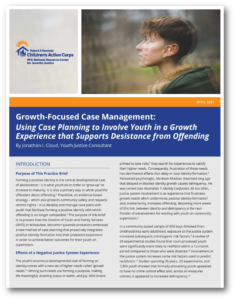Resources – Special Topics
Click here to return to the main Resources page.
 Growth-Focused Case Management: Using Case Planning to Involve Youth in a Growth Experience that Supports Desistance from Offending
Growth-Focused Case Management: Using Case Planning to Involve Youth in a Growth Experience that Supports Desistance from Offending
Jonathan I. Cloud, Robert F. Kennedy National Resource Center for Juvenile Justice, 2021
This Practice Brief presents the new Growth-Focused Case Management (GFCM) and supervision approach, which empowers youth to form a positive identity and progress beyond mere cessation of delinquent activity. In addition to protecting community safety and respecting victims’ rights, the purpose of GFCM is to develop and manage case plans with youth that facilitate forming a positive identity with which offending is no longer compatible. The GFCM principles and four-phase framework, detailed in this brief, are supported by evidence-based research and are currently being implemented in several jurisdictions throughout the country. This brief also presents how the Division of Youth and Family Services (DYFS) in Milwaukee, Wisconsin embraced and integrated GFCM into their juvenile probation experience in order to achieve better outcomes for their youth under supervision; while Milwaukee DYFS is still early in its GFCM implementation process, the preliminary outcomes are already very promising.
Webinar – Compliance Is Not Enough: Empowering Youth to Grow Out of Offending [VIDEO]
Presenters: Jonathan I. Cloud (Youth Justice Consultant), Robert Bermingham (Fairfax County, Virginia), & Melissa Graham (Milwaukee County, Wisconsin)
Hosts: Robert F. Kennedy National Resource Center for Juvenile Justice & OJJDP’s National Training and Technical Assistance Center (NTTAC), 2021
This webinar discusses the Growth Focused Case Management (GFCM) and supervision approach, which empowers youth to form a positive identity and progress beyond mere cessation of delinquent activity. The session was led by Jonathan Cloud, the author of the innovative GFCM approach and the four practices for supporting formation of a positive identity. The webinar details practical examples of how GFCM can complement risk-needs responsivity (RNR) instruments and includes a focus on positively including the youth in case planning. Additionally, leadership personnel representing participating sites within the Dennis M. Mondoro Probation and Juvenile Justice System Enhancement Project share initial reactions to the practicality of the GFCM approach and its compatibility with RNR approaches.
Additional Resources:
• Presentation PowerPoint Slides (PDF)
• Audio Transcript (PDF)
